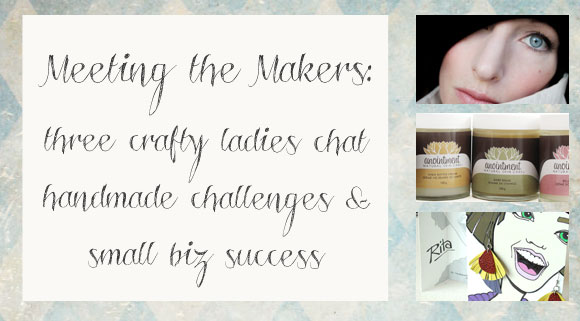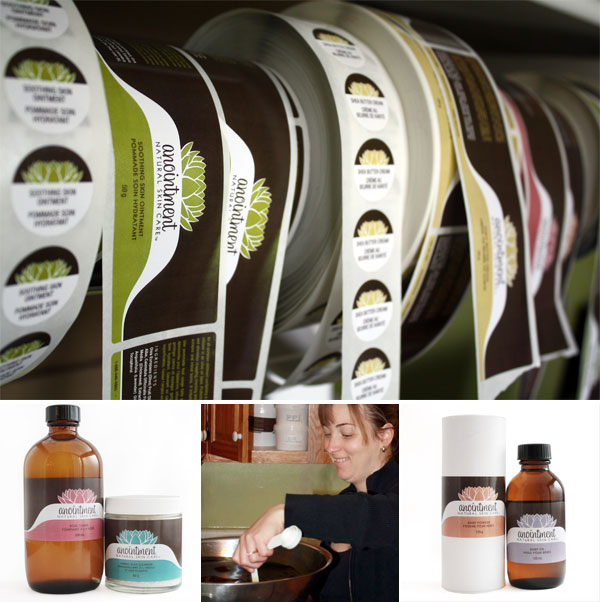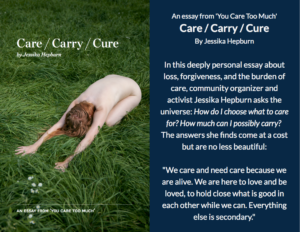by April MacKinnon of Anointment Natural Skin Care
Having gone from being a retailer in my previous business incarnation to a combination of wholesaler/retailer of my own skin care products, I’ve been closely watching the discussion of “the value of handmade”. I decided to examine my own company, and asked 2 ladies who also make and sell handmade items to join in the conversation with their experience.
Gillian Hyde is the creator of Pip Robins, a company dedicated to creating beautiful, sustainable cowl scarves for men and women. She is a retail manager by day and general all-around crafty mama by night! Rita van Tassel is a third-generation craftsperson, designer and teacher whose latest project is “Rita”, a signature line of leather and fabric jewelry.
How do you define success for your handmade company?
Each of us loves what we do. While Gillian and I were both aware of what was requited of our respective businesses to ensure profitability, Rita was quick to point out the realities of working in the handmade industry. “One does not get into the “business” of handmade for the financial freedom. Everyone I know who is pursuing even a part-time living from their creative skills does so because it’s a labour of love.” For each of us, success is defined as a combination of profitability to provide for our families and the satisfaction of producing goods that challenge us creatively.
All three of us felt that our business were being run on some variation of this principle I learned a long time ago from Jeremy Long, owner of Padraig Cottage, “run your business with your heart and the financial success will follow“. When you work with authenticity, it shines through!
Do you feel you can sell your product for a price that fully compensates you for the time required to make it?
Anointment product recipes are scalable to produce smaller or larger batches for most products. Some are limited to the size of my equipment, which makes them far more difficult to price as the batch sizes are very small and the time commitment is relatively large. Rita agrees that pricing competitively can be tricky. “The smaller pieces like my earrings are easier price fairly because I have a “system” of sorts down for when I put them together. Larger pieces like necklaces and especially one of a kind and/or specialty orders become more difficult. The actual number of hours it can take to design, prepare materials, assemble and package and market items can be huge.” The difficulty then lies in the bigger picture if a small-scale producer looks to shops and boutiques to sell their product. “…If an item is being sold through a shop or gallery the artist may only get half the amount on the price tag.” Anointment products are priced such that I am compensated for the materials, even at wholesale prices, but not such that would allow me to have a dedicated production facility and staff to help me produce it.
Gillian admits to initially under pricing her product for the same reason many of us do, “…I didn’t know if other people would see the same thing that I did when I first started. I thought if it was cheap SOMEONE would certainly buy it.” When her Pip Robins cowls started selling so quickly she couldn’t keep up with demand, she increased the prices in an effort to stem the pace of the orders. She found that as the prices went up, sales continued to increase, while the time required to produce a cowl was decreasing as a result of experience. This year, her profits will allow her to expand her business and invest in newer, higher quality equipment.
One could argue that one of a kind custom work may suffer in this type of structure where systematic production is required to make a handmade product profitable. This may raise larger issues around craft and artistry. If there is a “cookie cutter” formula for a product, does that diminish the allure? Rita feels the biggest challenge faced by handmade businesses such as hers is educating the public about the value of handmade. “Fortunately for us there is an ever-growing population of people who are re-valuing quality handmade goods as well as supporting local economy. We are, however, still living in a culture based on the convenience of disposable products. It’s very important to establishing a customer base to be able to teach your clients about everything that not only makes your product attractive aesthetically, but also ethically.” While Gillian and I both agree with Rita on this point, as mothers of one child and three children, respectively, we both chime in that our biggest challenge is time – there is never enough of it!
Do you have a formal business plan or are you winging it?
Gillian’s response said it best: “I am 100% winging it. It feels like I have less to lose this way, and it also feels more organic.” Rita’s situation is similar, “My line is currently more like a big project for me. It’s just been within the past six months that I’ve really spent time refining my brand identity.” For small businesses that specialize in handmade goods, you may have the luxury of turning your hobby into a job, or not needing specialized equipment that may require financing and a business plan. It is critically important you set your pricing in a way that compensates you for your product if you intend to make your business sustainable and define your ideal customer and target audience, but how you compile this information is up to you. Now that Anointment is my full-time job, I will be formulating a much more comprehensive plan to make it as successful as I need it to be to support my family while avoiding some of the financial mistakes I made with my first business.
Pricing and value aside, the resounding advice for new business from the three of us is:
Create a quality product. Do it because you love it. Be thankful for every sale you make. Be kind to your customers. Never stop having fun.
Like Rita said when I asked her to share what she’d learned that may help others in building their own business:
“Do it because you love it. If you love what you make, then the inevitable times when you aren’t making any sales and you’ve convinced yourself that the world hates your work will be much easier to get past.
Chin up! If you know that you’re doing something for the right reasons, let that confidence come through in all aspects of your product and marketing. Keep putting your awesome product out there!”
April MacKinnon is the owner of Anointment Natural Skin Care now based in Sackville, New Brunswick (Canada). Visit April’s blog at www.loosegravel.ca. Find Anointment on Facebook and Twitter.





